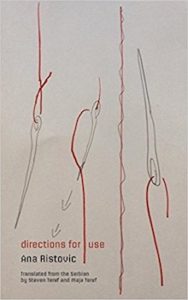“Directions for Use” by Ana Ristović [Why This Book Should Win]
Today’s poetry entry into the Why This Book Should Win series is from BTBA judge—and Riffraff co-owner—Emma Ramadan.

Directions for Use by Ana Ristović, translated from the Serbian by Steven Teref and Maja Teref (Serbia, Zephyr Press)
Very occasionally, reading a book in translation can feel like I’m sitting across from a friend having coffee, and I get a little start when I remember that the book was written by someone I’ve never met, in a country I’ve never been to, and in a language I’ve never heard spoken aloud. So familiar are the sentiments, so inhabitable are the ideas, so comforting is the communality between my lived experience and the words on the page.
Ana Ristović’s Directions for Use is full of sexy, coy, ruthless poems about the body, about a woman’s experience, about love and lovemaking, about the life of a poet, about the underbelly of the day to day. Her poems are funny and terrifying all at once. seem on the surface to be deceivingly lighthearted or perhaps even lovely. But there is something darker lurking beneath the surface to stir up your ways of thinking about everyday occurrences.
As her translators Steven Teref and Maja Teref mention in their foreword, Ristović refreshingly breaks from the “Western stereotype of Eastern European writing as chronicling political persecution, depressing tones and bleak lives . . . The poet represents a new generation.” In a translation that finely emulates Ristović’s rhythms and peculiar word choices meant to accommodate seemingly nonsensical ideas that when read in this book somehow make perfect sense, this new poetry shines.
In “Circling Zero,” Ristović describes female masturbation as caught up in the female experience.
We are independent women.
We breathe asthmatically
while waiting for new love.
We pop pills
of unfulfilled promises. We drown in murky dreams.
Twenty-four hours a day we painfully make love
to a migraine and forgive her
because she’s female.
. . .
Independent, we claim, more than ever.
Yet during lonely nights, in our tight vulva
more and more, we insert a small magical finger,
as if placing a bullet into the chamber
which refuses to fire.
And we smile with sadness in dreamless dreams.
And the safe hand, circling
the soft zero.
Other treatments of women’s bodies and experiences are equally jarring and yet immediately comprehensible, as in “The Body,” when she describes “a woman’s bones shuffling across the street / like fragile musical instruments.” And in “ Little Zebras”:
When she opens her eyes she gazes at aluminum clouds; snow drifts through her skin. Glass pins
sink into the little canyons of her pupils and hoarfrost
spills from her smiling lips. She covers her face
with squeaky palms.
The author of six books of poetry, the translator of over 20 books of Slovenian literature into Serbian, and the recipient of numerous European awards, Ristović has an uncanny way of describing the outside and the inside at the same time, of seeing the world from one step more removed than the rest of us and showing us what we’re missing. Reading her poems, I felt like she was winking at me, showing me glimpses of just how connected we all are.

Leave a Reply